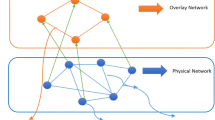Abstract
The key principles behind current peer-to-peer research include fully distributing service functionality among all nodes participating in the system and routing individual requests based on a small amount of locally maintained state. The goals extend much further than just improving rawsy stem performance: such systems must survive massive concurrent failures, denial of service attacks, etc. These efforts are uncovering fundamental issues in the design and deployment of distributed services. However, the work ignores a number of practical issues with the deployment of general peer-to-peer systems, including i) the overhead of maintaining consistency among peers replicating mutable data and ii) the resource waste incurred by the replication necessary to counteract the loss in locality that results from random content distribution. We argue that the key challenge in peer-to-peer research is not to distribute service functions among all participants, but rather to distribute functions to meet target levels of availability, survivability, and performance. In many cases, only a subset of participating hosts should take on server roles. The benefit of peer-to-peer architectures then comes from massive diversity rather than massive decentralization: with high probability, there is always some node available to provide the required functionality should the need arise.
This research is supported in part by the National Science Foundation (EIA-9972879, ITR-0082912), Hewlett-Packard, IBM, Intel, and Microsoft. Braynard and Reynolds are supported by an NSF graduate fellowships and Vahdat is also supported by an NSF CAREER award (CCR-9984328).
Access this chapter
Tax calculation will be finalised at checkout
Purchases are for personal use only
Preview
Unable to display preview. Download preview PDF.
Similar content being viewed by others
References
Guillermo A. Alvarez, Mustafa Uysal, and Arif Merchant. Efficient Verification of Performability Guarantees. In Fifth International Workshop on Performability Modeling of Computer and Communication Systems (PMCCS 5), September 2001.
Rebecca Braynard, Dejan Kostić, Adolfo Rodriguez, Jeffrey Chase, and Amin Vahdat. Opus: an Overlay Peer Utility Service. In Proceedings of the 5th International Conference on Open Architectures and Network Programming (OPENARCH), June 2002.
Jeffrey S. Chase, Darrell C. Anderson, Prachi N. Thakar, Amin M. Vahdat, and Ronald P. Doyle. Managing Energy and Server Resources in Hosting Centers. In Proceedings of the 18th ACM Symposium on Operating System Principles (SOSP), October 2001.
Frank Dabek, M. Frans Kaashoek, David Karger, Robert Morris, and Ion Stoica. Wide-area Cooperative Storage with CFS. In Proceedings of the 18th ACM Symposium on Operating Systems Principles (SOSP’01), October 2001.
Dejan Kostić, Adolfo Rodriguez, and Amin Vahdat. Scalability and Adaptivity in Two-Metric Overlays. Technical report, Duke University, May 2002. http://www.cs.duke.edu/~vahdat/ps/acdc-full.pdf
John Kubiatowicz, David Bindel, Yan Chen, Patrick Eaton, Dennis Geels, Ramakrishna Gummadi, Sean Rhea, Hakim Weatherspoon, Westly Weimer, Christopher Wells, and Ben Zhao. OceanStore: An Architecture for Global-scale Persistent Storage. In Proceedings of ACM ASPLOS, November 2000.
Sylvia Ratnasamy, Paul Francis Mark Handley, Richard Karp, and Scott Shenker. A Content Addressable Network. In Proceedings of SIGCOMM 2001, August 2001.
Antony Rowstron and Peter Druschel. Pastry: Scalable, Distributed Object Location and Routing for Large-scale Peer-to-Peer Systems. In Middleware’2001, November 2001.
Antony Rowstron and Peter Druschel. Storage Management and Caching in PAST, a Large-Scale, Persistent Peer-to-Peer Storage Utility. In Proceedings of the 18th ACM Symposium on Operating Systems Principles (SOSP’01), October 2001.
H. Salama, Y. Viniotis, and D. Reeves. An Efficient Delay Constrained Minimum Spanning Tree Heuristic, 1996.
Stefan Saroiu, P. Krishna Gummadi, and Steven D. Gribble. A Measurement Study of Peer-to-Peer File Sharing Systems. In Proceedings of Multimedia Computing and Networking 2002 (MMCN’02), January 2002.
Ion Stoica, Robert Morris, David Karger, Frans Kaashoek, and Hari Balakrishnan. Chord: A Scalable Peer to Peer Lookup Service for Internet Applications. In Proceedings of the 2001 SIGCOMM, August 2001.
Marc Waldman, Aviel D. Rubin, and Lorrie Faith Cranor. Publius: A Robust, Tamper-evident, Censorship-resistant, Web Publishing System. In Proc. 9th USENIX Security Symposium, pages 59–72, August 2000.
Zheng Wang and Jon Crowcroft. Quality-of-Service Routing for Supporting Multimedia Applications. IEEE Journal of Selected Areas in Communications, 14(7):1228–1234, 1996.
Haifeng Yu and Amin Vahdat. Design and Evaluation of a Continuous Consistency Model for Replicated Services. In Proceedings of Operating Systems Design and Implementation (OSDI), October 2000.
Haifeng Yu and Amin Vahdat. The Costs and Limits of Availability for Replicated Services. In Proceedings of the 18th ACM Symposium on Operating Systems Principles (SOSP), October 2001.
Haifeng Yu and Amin Vahdat. Minimal Replication Cost for Availability. In Proceedings of the ACM Principles of Distributed Computing, July 2002.
Author information
Authors and Affiliations
Editor information
Editors and Affiliations
Rights and permissions
Copyright information
© 2002 Springer-Verlag Berlin Heidelberg
About this paper
Cite this paper
Vahdat, A., Chase, J., Braynard, R., Kostić, D., Reynolds, P., Rodriguez, A. (2002). Self-Organizing Subsets: From Each According to His Abilities, to Each According to His Needs. In: Druschel, P., Kaashoek, F., Rowstron, A. (eds) Peer-to-Peer Systems. IPTPS 2002. Lecture Notes in Computer Science, vol 2429. Springer, Berlin, Heidelberg. https://doi.org/10.1007/3-540-45748-8_7
Download citation
DOI: https://doi.org/10.1007/3-540-45748-8_7
Published:
Publisher Name: Springer, Berlin, Heidelberg
Print ISBN: 978-3-540-44179-3
Online ISBN: 978-3-540-45748-0
eBook Packages: Springer Book Archive




